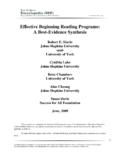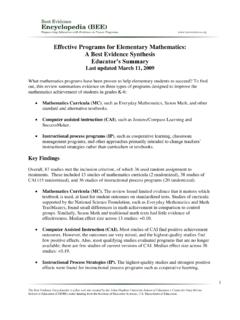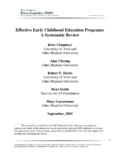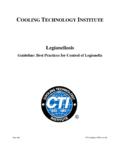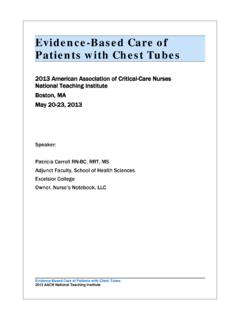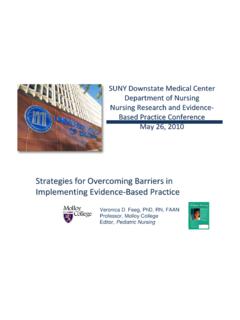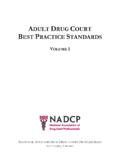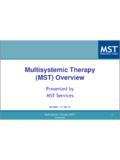Transcription of Effective Programs in Elementary Mathematics - …
1 The best evidence Encyclopedia is a free web site created by the Johns Hopkins University School of Education s Center for Data-Driven Reform in Education (CDDRE) under funding from the institute of Education Sciences, Department of Education. 1 Effective Reading Programs for the Elementary Grades: A best - evidence Synthesis Robert E. Slavin Johns Hopkins University -and- University of York Cynthia Lake Johns Hopkins University Bette Chambers University of York -and- Johns Hopkins University Alan Cheung Johns Hopkins University Susan Davis Success for All Foundation January, 2010 _____ This research was funded by the institute of Education Sciences, Department of Education (Grant No. R305A040082). However, any opinions expressed are those of the authors and do not necessarily represent IES positions or policies. We thank Marilyn Adams, Steven Ross, Michael McKenna, Henry Becker, and Nancy Madden for comments on an earlier draft.
2 The best evidence Encyclopedia is a free web site created by the Johns Hopkins University School of Education s Center for Data-Driven Reform in Education (CDDRE) under funding from the institute of Education Sciences, Department of Education. 2 Abstract This article systematically reviews research on the achievement outcomes of four types of approaches to improving the reading success of children in the Elementary grades: reading curricula, instructional technology, instructional process Programs , and combinations of curricula and instructional process. Study inclusion criteria included use of randomized or matched control groups, a study duration of at least 12 weeks, valid achievement measures independent of the experimental treatments, and a final assessment at the end of grade 1 or later. A total of 63 beginning reading (starting in K or 1) and 79 upper Elementary (2-5) reading studies met these criteria.
3 The review concludes that instructional process Programs designed to change daily teaching practices have substantially greater research support than Programs that focus on curriculum or technology alone. The best evidence Encyclopedia is a free web site created by the Johns Hopkins University School of Education s Center for Data-Driven Reform in Education (CDDRE) under funding from the institute of Education Sciences, Department of Education. 3 From the first day of kindergarten to the last day of Elementary school, children substantially define themselves as readers, and this has enormous influence on their development as learners and as members of society. Those who succeed in becoming fluent, strategic, and joyful readers are not guaranteed success in school or in life, but they are well on their way. However, those who do not succeed in reading, or who become reluctant readers, face long odds in achieving success in school and life.
4 Every educator, parent, and policy maker knows the critical importance of reading in the Elementary grades. Further, the gap in reading performance between different ethnic groups, and between middle class and disadvantaged children, is perhaps the most important policy issue in education in the Because of the obvious importance of success in reading, schools invest enormous sums in initial teaching of reading and in remedial services for struggling readers. Given the great importance of success in reading for millions of children and for our society as a whole, one would imagine that there would be a great deal of research on how teachers can most effectively teach children to read. There is in fact a great deal of basic research on reading, and we know a lot about how children learn to read and what goes wrong when they fail to learn (see for example National Reading Panel, 2000; Snow, Burns, & Griffin, 1998; National Early Literacy Panel, 2008).
5 Yet there is much less research evaluating the practical Programs actually available to schools and teachers to ensure reading success, and the research that does exist has not been comprehensively reviewed. It is useful, for example, to know that Effective beginning reading Programs emphasize phonemic awareness, phonics, fluency, vocabulary, and comprehension, as concluded by the National Reading Panel (NRP, 2000). Reviews by Adams (1990) and by Snow, Burns, & Griffin (1998), as well as the NRP, have supported the importance of teaching with a strong emphasis on The best evidence Encyclopedia is a free web site created by the Johns Hopkins University School of Education s Center for Data-Driven Reform in Education (CDDRE) under funding from the institute of Education Sciences, Department of Education. 4 phonics and phonemic awareness.
6 Yet school leaders and teachers do not choose between phonics and no phonics. Instead, they choose among particular textbooks, software, and professional development approaches. Any particular program may incorporate the five NRP elements to a greater or lesser degree, but each also incorporates other features (such as classroom organization, motivation, grouping, assessment, and professional development) that also determine the outcomes of the program. The importance of focusing attention on all aspects of reading approaches, not just on phonics or other NRP elements, was illustrated by the experience of the federal Reading First program. Based in large part on the findings of the National Reading Panel (2000) and earlier research syntheses, the Reading First program favored phonics and phonemic awareness, and a national study of Reading First by Gamse et al.
7 (2008) and Moss et al. (2008) found that teachers in Reading First schools were in fact doing more phonics teaching than were those in similar non-Reading First schools. Yet outcomes were disappointing, with small effects seen on first grade decoding measures and no impact on comprehension measures in grades 1-3. Similarly, a large study of intensive professional development focusing on phonics found no effects on the reading skills of second graders (Garet et al., 2008). The findings of these large-scale experiments imply that while the importance of phonics and phonemic awareness in reading instruction are well established, the addition of phonics to traditional basal instruction is not sufficient to bring about widespread improvement in children s reading. Other factors, especially relating to teaching methods, are also consequential. The What Works Clearinghouse (WWC, 2009), in its beginning reading topic report, reviewed research on reading Programs evaluated in grades K through 3.
8 However, the WWC only reports program ratings, and does not include discussion of the findings or draw The best evidence Encyclopedia is a free web site created by the Johns Hopkins University School of Education s Center for Data-Driven Reform in Education (CDDRE) under funding from the institute of Education Sciences, Department of Education. 5 generalizations about the effects of types of Programs . Further, WWC inclusion standards applied in its beginning reading topic report include very brief studies (as few as 5 hours of instruction), and studies that used measures of skills taught in experimental but not control groups. It does not weight by sample size, and many of its conclusions are based on atypical effect sizes from studies with sample sizes as small as 46 (see Slavin, 2008). The present article reviews research on the achievement outcomes of practical initial (non-remedial) reading Programs for all Elementary children, grades K-5, applying consistent methodological standards to the research.
9 It is intended to provide fair summaries of the achievement effects of the full range of reading approaches available to educators and policy makers, and to summarize for researchers the current state of the art in this area. The scope of the review includes all types of Programs that teachers, principals, or superintendents might consider to improve the success of their children in reading: curricula, instructional technology, instructional process Programs , and combinations of curricula and instructional process. The review uses a form of best evidence synthesis (Slavin, 1986), adapted for use in reviewing what works literatures in which there are generally few studies evaluating each of many Programs . It is part of a series, all of which used the same methods with minor adaptations. Separate syntheses review research on remedial, preventive, and special education Programs in Elementary reading (Slavin, Lake, Davis, & Madden, 2009), middle and high school reading Programs (Slavin, Cheung, Groff, & Lake, 2008), and reading Programs for English language learners (Cheung & Slavin, 2005).
10 The best evidence Encyclopedia is a free web site created by the Johns Hopkins University School of Education s Center for Data-Driven Reform in Education (CDDRE) under funding from the institute of Education Sciences, Department of Education. 6 Focus of the Current Review The present review uses procedures similar to those used in the secondary reading review to examine research on initial (non-remedial) Programs for Elementary reading. The purpose of the review is to place all types of initial reading Programs intended to enhance reading achievement on a common scale, to provide educators and policy makers with meaningful, unbiased information that they can use to select Programs most likely to make a difference with their students. The review emphasizes practical Programs that are or could be used at scale. It therefore emphasizes large studies done over significant time periods that used standard measures, to maximize the usefulness of the review to educators.

